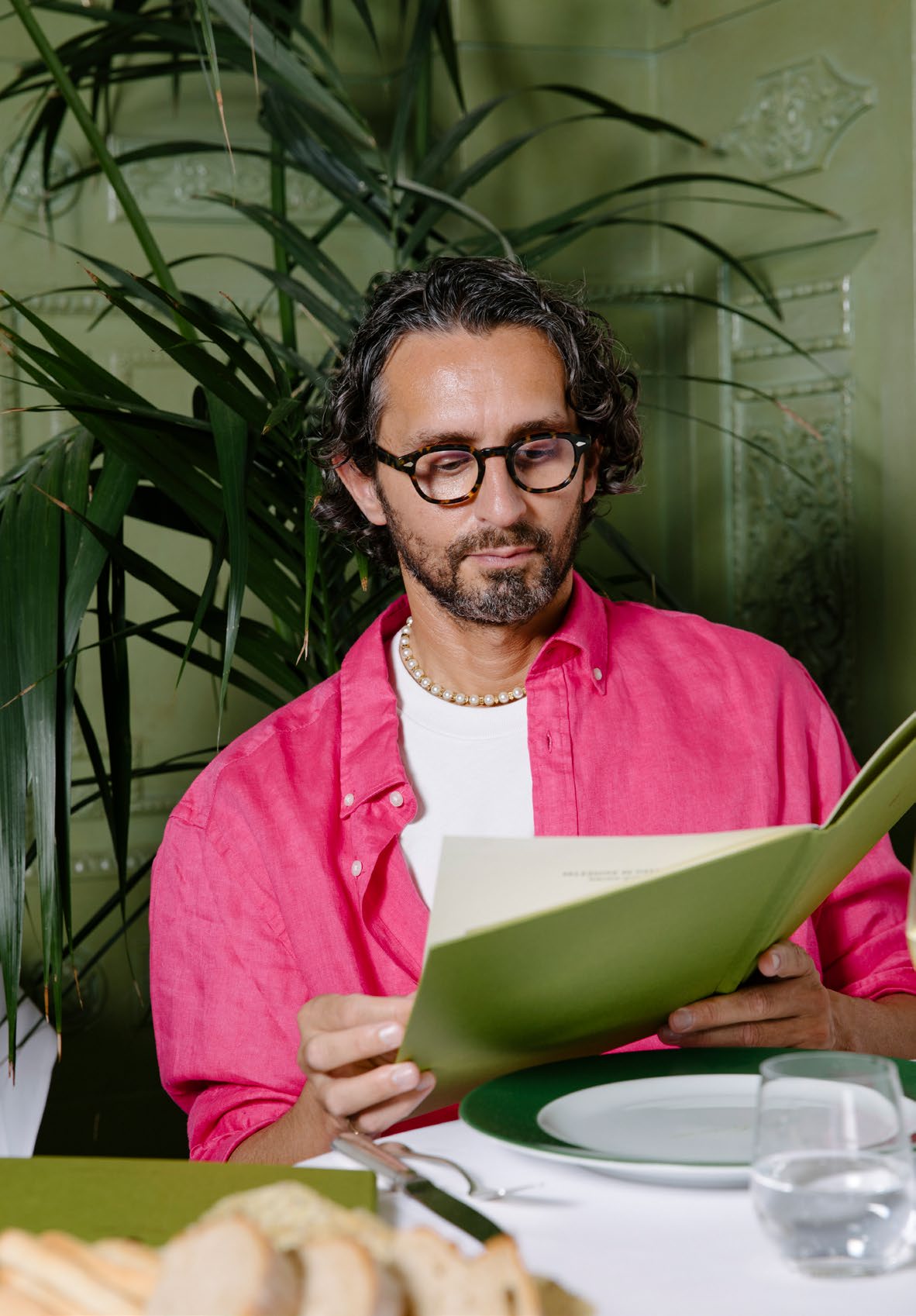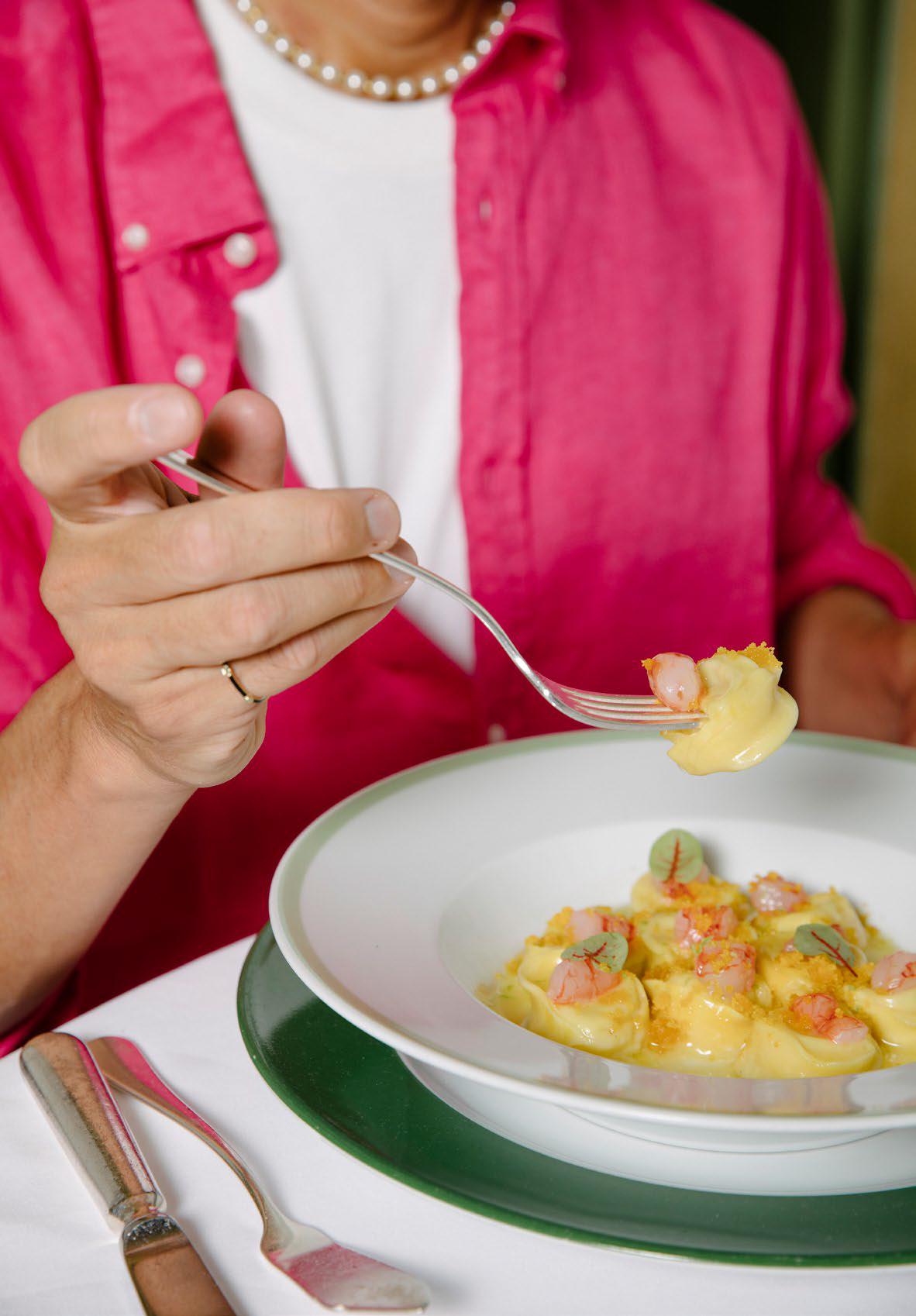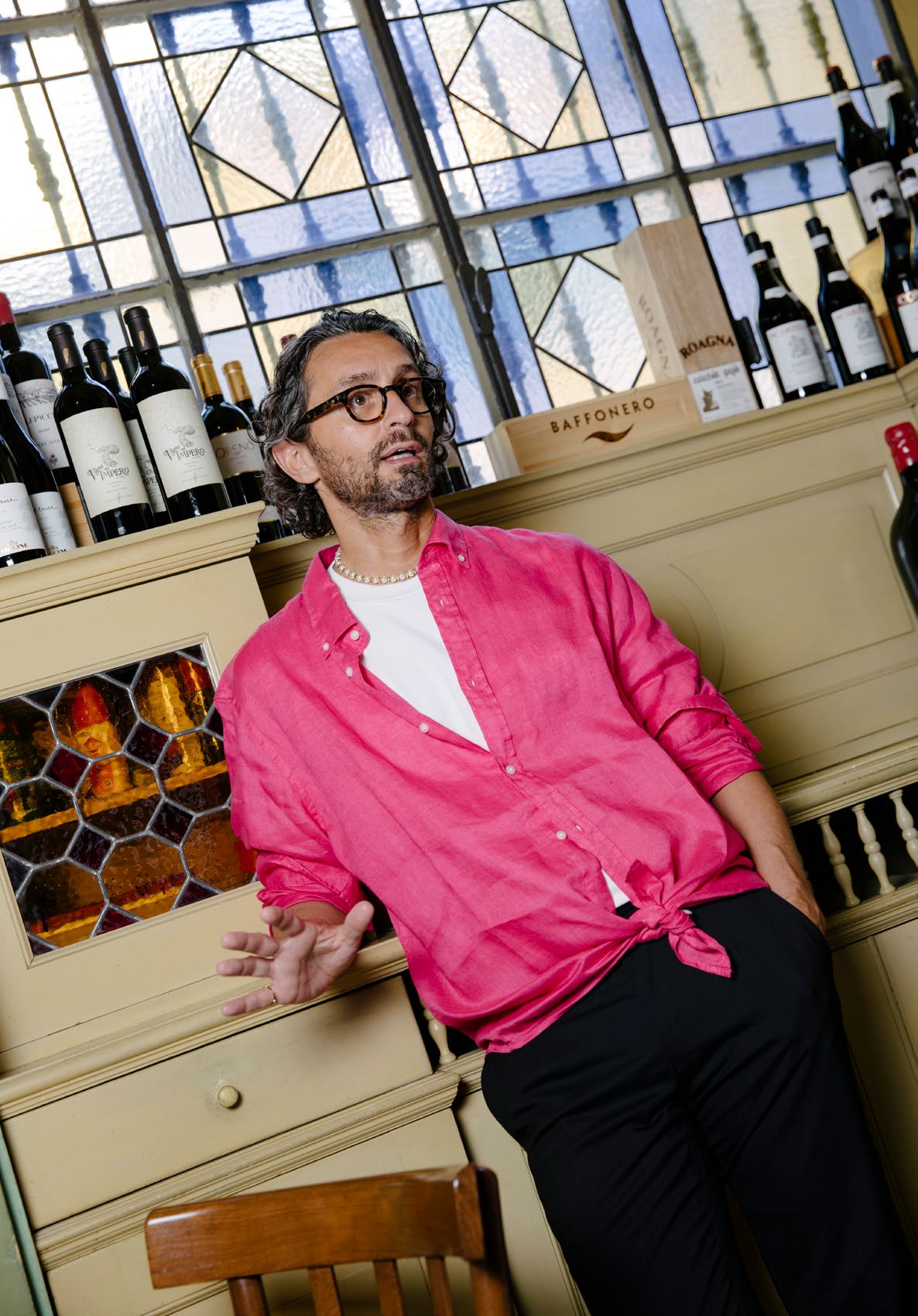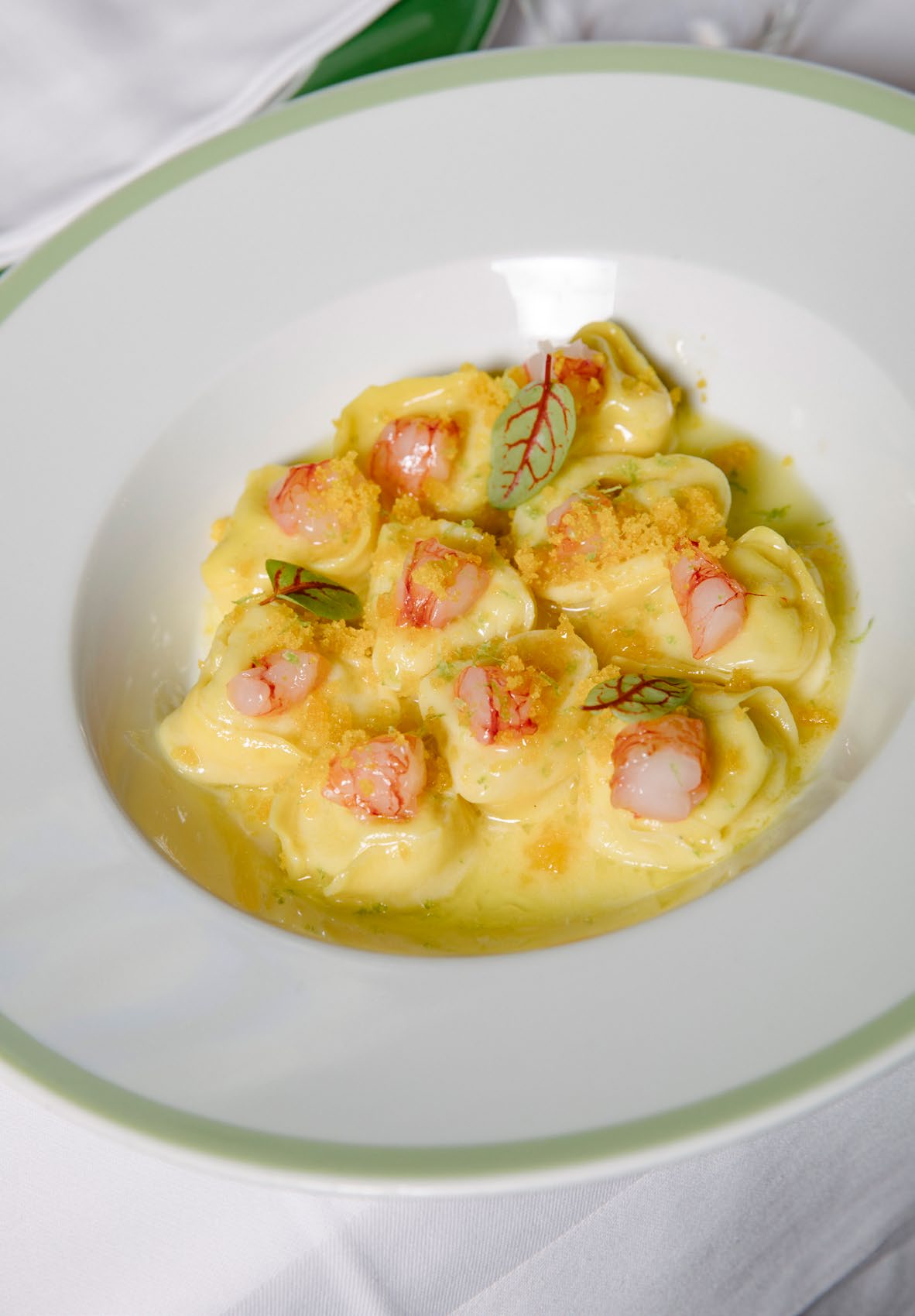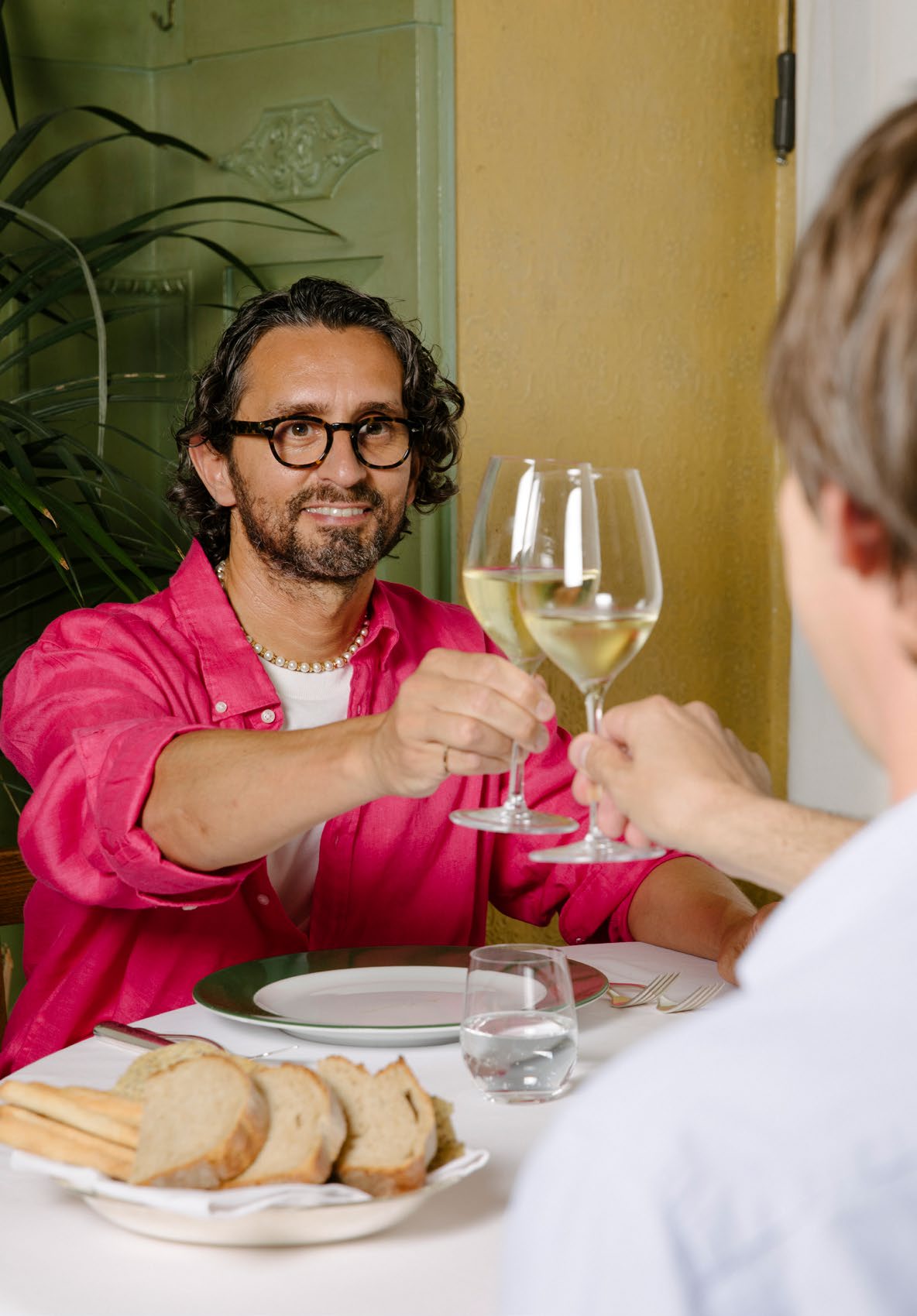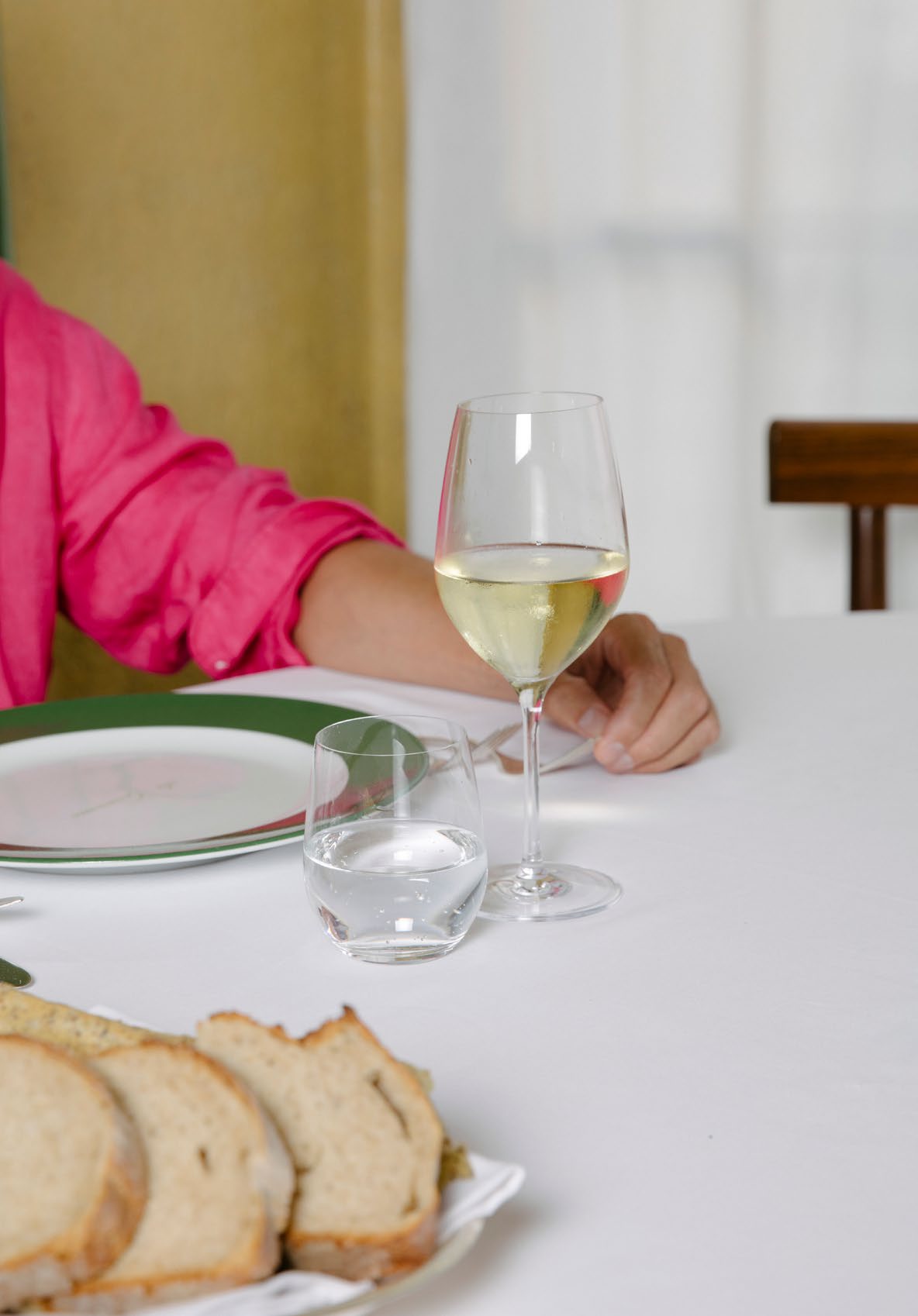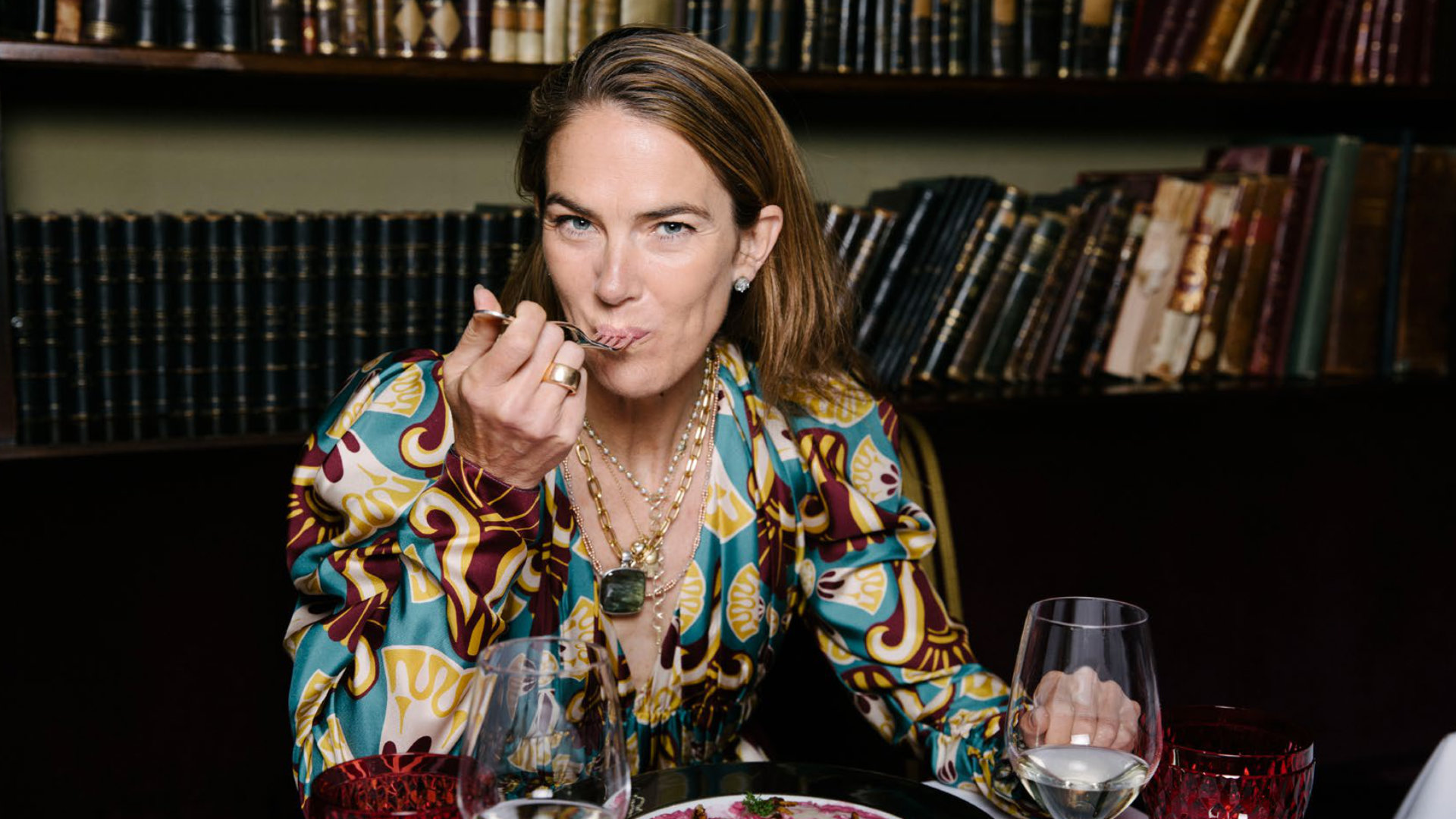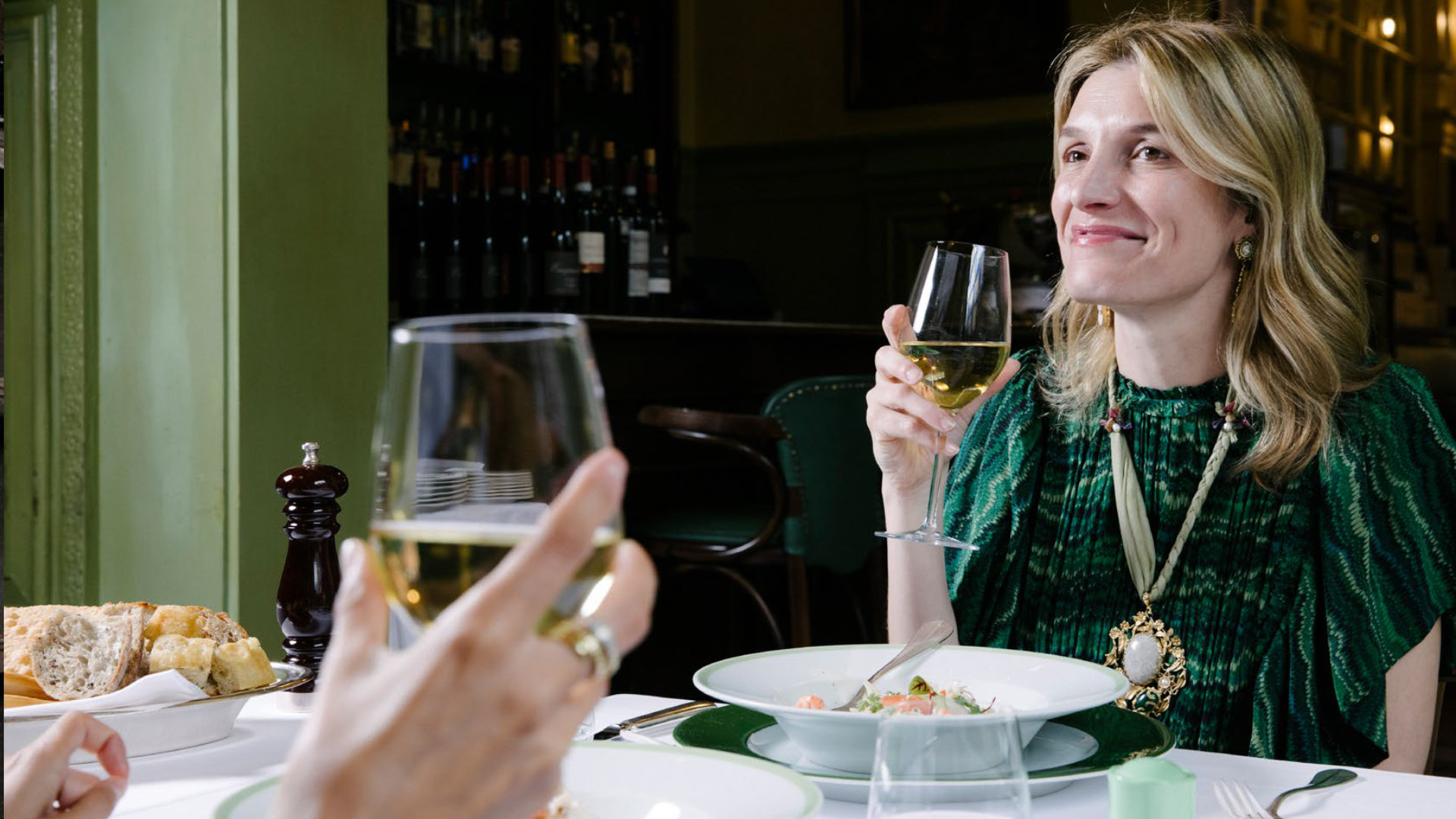Simone Marchetti, the director of Vanity Fair, has been a regular visitor to Giacomo for years. During lunch, he revealed one of his favorite pastimes: observing the variety of people who populate our venues, where good food, convivial atmosphere, and the art of being together become cultural ambassadors.
Tell us about your professional journey. When did your passion for fashion begin, and how did you manage to incorporate it into the editorial field?
I don't remember exactly, just as I don't remember the first time I came to Giacomo's. I don't remember a lot of things about my life, but it's better that way because I prefer to forget and make room for the new. Fashion educates you to that. Style remains still and immobile, while fashion forces you to change constantly, and I like that. I turned it into a profession little by little, with consistency. It took me a lot of years. I didn't enter through the back door, but through another door. At first, I worked as a mask at Teatro alla Scala while studying philosophy in Milan. Then I started writing for some agencies, for some independent newspapers, and later became a collaborator. Slowly, I reached where I am today. No one in my family did this job. I think what brought me here is perseverance, passion, and a lack of nostalgia.
Is there a particular figure you consider a mentor or who has inspired you? Why?
There are many. Some imaginary, others very real. There are all the writers I read as a teenager, who kept me company and were my best friends, and then there are people who really helped me in my professional journey. It's impossible to name them all. I mention the latest, who saw me, studied me, made me grow, and with whom I now work a lot: her name is Anna Wintour, the best boss a person can have.
You were among the first to talk about the rise of bloggers and, more generally, the digital world within fashion. How has the consumption of news and trends changed over the years?
It hasn't just changed; it continues to change. Now, with artificial intelligence, and tomorrow, with other challenges. We are experiencing one of the greatest changes in human history. A moment like this occurred when writing or printing was invented. It's something that future generations will probably realize. What we shouldn't do is be nostalgic.
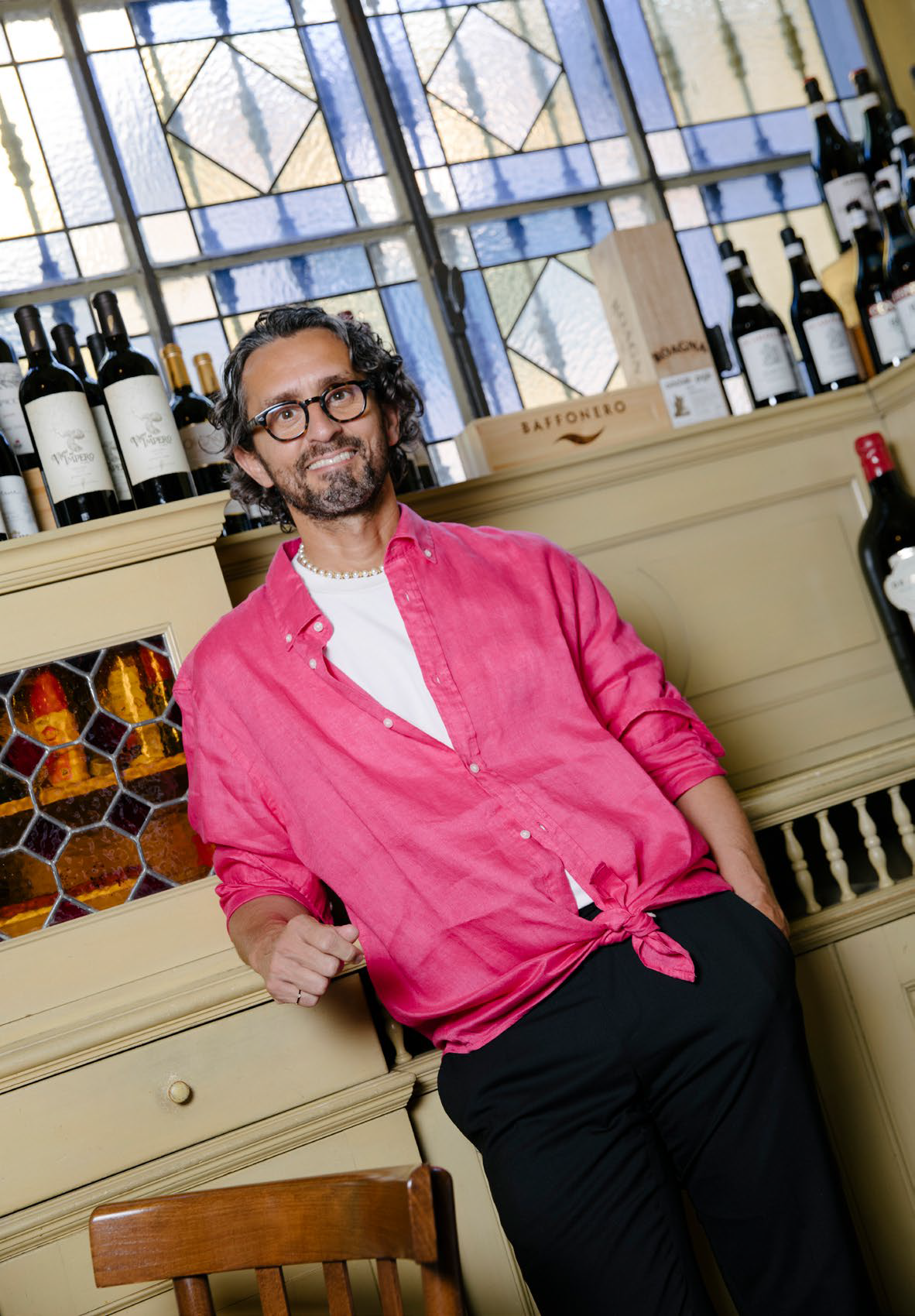
What impact has this evolution had on your work and, more generally, on print media?
It has made me who I am and increasingly made me understand that nostalgia serves no purpose. You must bring tradition and what you have learned into the future. Moreover, I think there is also a more progressive task, not only professional. The progressive task is to leave the world a little better than you received it. So, work, for me, is also a political act and serves to change things.
In 2019, you became the Editor in Chief for Vanity Fair Italy and later the European Editorial Director of Vanity Fair. Your profession has allowed you to have important experiences and encounters with personalities of all kinds. Is there an event or anecdote that has particularly stayed with you and that you'd like to share?
It's a tough question for me. I can answer by saying that once I went to New York to interview a very talented artist who creates detailed miniatures, and she told me, "You see, you have to learn that it's not you looking at art and things; it's things looking at you and transforming you. So, learn to be looked at by things." In my work, I've learned to be looked at and crossed by other people's stories. So, spending two days with Madonna on a set, listening to Michela Murgia's stories, or the embarrassments and dreams of Maneskin at the beginning, or touring Rome in the silence of the pandemic with Sorrentino for a special issue of Vanity Fair... there are so many things, so beautiful, but from which I let myself be looked at. And that's what I do with the newspaper; I put people on the stage, watch them, and make sure they express themselves in total freedom. I like to observe emotions and put people in a position to tell their stories, making sure their stories inspire others. That's the most beautiful thing I do.
In an increasingly fast and connected reality, working in the world of publishing and communication can become quite intense. How do you manage to find a balance between work and personal time?
I escape. I have refined the art of escape. A dear friend named Anna Dello Russo explained to me that, to fill your work and life with ideas and things, you have to create voids. My void is above the hills of Piacenza, in the first house I bought, surrounded by nature. I take my two dogs, go into the woods, forget everything, and in those moments, the best ideas come.
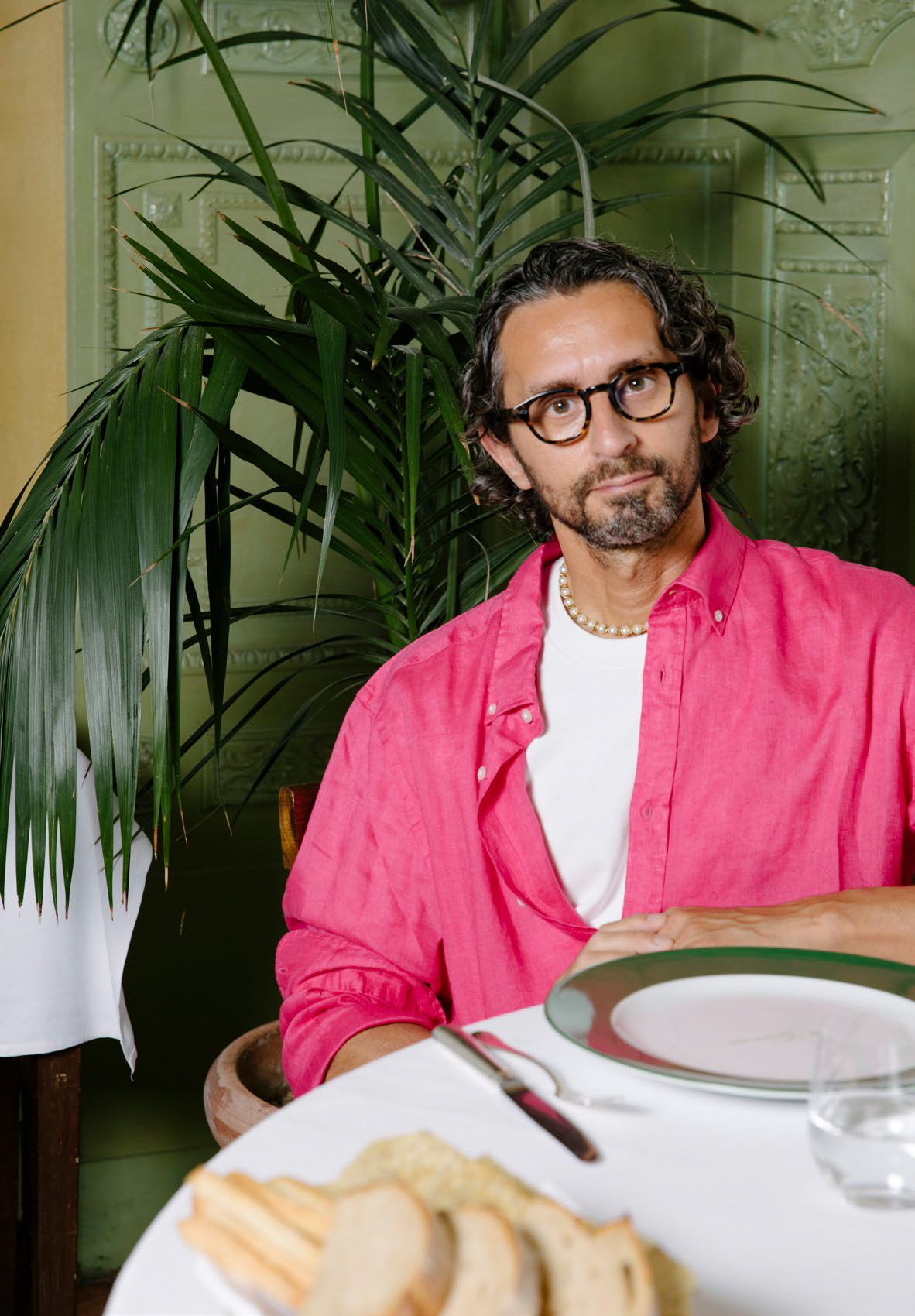
Milan is a place dear to Giacomo; the first restaurant was opened here, and we grew before deciding to expand the business to other areas of Italy. How would you describe your relationship with the city? Are there places you feel particularly attached to?
Milan, for me, is and remains the place where dreams can come true. It is the most European city in Italy and one of the most international in Europe. It has been great for me because it allowed me to become who I am. Certainly, Giacomo is one of my favorite places. It's the institution where I bring people for business dinners, my parents... While the counter at Giacomo Bistrot is like a harbor where boats, ships, yachts, and runaways arrive. Someone rich, someone not, someone intelligent, someone not, someone well-dressed, someone poorly dressed... and I like watching all this humanity. Understanding and seeing, having lunch or dinner while all this happens. There are many other places: the vegetable gardens and the Brera Academy, which are magnificent places; a church in Corso Magenta, five minutes from the office, where I go to create emptiness occasionally; Porta Venezia Park, where I take the dogs every day.
Do you remember the first time you visited Giacomo's? Was it a special occasion?
I have to be honest; things are coming to my mind. The immediate answer I would give is no, but I remember that when I was a student, I worked for an agency of opera singers and probably came here one of the first times with a group of singers. They were here for a show at La Scala, maybe a Traviata, I don't remember... and I think we came for lunch, not even dinner. It was the mid-'90s. But I could be wrong.
What impressed you the most about our venue?
The color. The color and the decor, which I found so wrong and so right, like all beautiful things. At that time, there were Japanese designers and minimalist hotels with cream sofas and butter-colored walls, futons, and everyone ate sushi... and it was a big lie. Here, there was reality. It was something timeless. It impressed me for that.
The concepts of conviviality, warmth, and sharing play a fundamental role in Giacomo's philosophy and the service we provide to our guests. What does conviviality mean to you?
It is the basis of civilization. Civilization is based on good manners, and good manners are civilization. And I'm not referring to education but to the ability to build bridges between people who think differently. When a place like a restaurant, for example, manages to become a place of conviviality, it is the height of civilization. Because food and good manners, the art of being together, are like cultural ambassadors. They allow people to get to know each other, understand each other, improve themselves, change their minds, and it's the most beautiful thing in the world.
GWhat did you order for your lunch at Giacomo today?
I was undecided. As always, I come with an idea and then change it. I ordered the cacio e pepe ravioli with shrimp, but looking back, maybe I would order something else. Like risotto or fried food. Well... unfortunately, I have a big problem with fried food. With champagne and fried food, oysters and foie gras... well, I have several problems with food. Let's put it that way.
Giacomo Bulleri, our founder, strongly believed in the ability of food to evoke a whole spectrum of memories and sensations, thanks to flavors, textures, and their combination. What does this dish bring to your mind?
One of the things it brings to mind is him. I remember seeing him when he arrived in the evening, how he looked at people, his curiosity. And I always liked that a lot. I was introduced to him several times, but he was a rather reserved character. I liked that too. This particular dish reminds me of the most beautiful things in Rome and the most beautiful things about summer at the seaside, combined in Milan. It's a sort of imaginary vacation.
We like to think of Giacomo as a great open-air salon where pleasant and unexpected encounters can take place. Has anything like this ever happened to you?
Always. I come here just for that, in addition to the food. As I mentioned earlier, the best places, the best restaurants, the best social gathering spots that manage to trigger conviviality, meaning civilization, are one of the pinnacles of humanity. It's the most beautiful thing because here you can meet people from the Middle East, Asia, America, South America and feel completely different, and that's why diversity enriches. Places that know how to cultivate diversity are places that know how to sow the future.
If you had to describe your experience at Giacomo in three words, what would they be?
Lively, in the most beautiful sense of the term. Here, there is the noise of life, and I like sitting at the counter for that reason. Glasses always break! I love it when it happens. If a glass doesn't break at a party, it's not the right party. Because at some point, someone makes a wrong move, someone dances too much, the waiter goes too fast... it's the noise of life, it's beautiful. Convivial, in the sense of the unity of diversity and humanity, in the sense of civilization. And then Italian.
